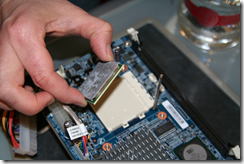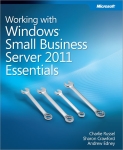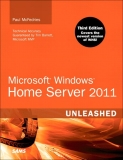HP MediaSmart Server Processor Upgrade
The site Home Server Hacks have posted a tutorial on how to upgrade the processor in the HP MediaSmart Server EX470/475 from the supplied 1.8GHz Sempron, which is a Socket AM2 to a low power (45W) 2.6GHz processor with 1MB of L2 cache (from 256KB in the Sempron). And all for the bargain basement price of only $55.
All the details including test results are available to read here.
Share this WHS Article with Others:





My biggest problem with that article is that doesn’t go into detail about any benefits, if any, from upgrading the CPU. The little benchmarks that were shown would only really apply for a desktop machine running in a desktop role.
Lets see:
Drive Balancing
Folder Duplication
Gigabit network performance
In my mind, these are the kinds of things you would want to show performance gains attributed to a CPU upgrade.
But, I am willing to bet the difference would be minimal, at best.
CPU performance alone isn’t the whole story Todd.
What about jumbo frames for heavy throughput?
Another idea is with a NAS accelerator (network-attached storage accelerator). Which is a printed circuit card that offloads TCP/IP processing from a microprocessor. This can reduce latency, increase throughput, and reduce overhead costs in a storage area network (SAN). A NAS accelerator is also called a TCP/IP accelerator network interface card or a TCP offload engine (TOE) network interface card (TNIC).
A high-end NAS accelerator can process Internet functions including e-mail and Web browsing, file transfers, and file serving, as well as data backup and archiving. This allows all network applications to run faster, because the microprocessor is not burdened with TCP/IP processing.
It is claimed that the installation of NAS accelerators can provide network performance improvement comparable to that obtained by doubling the number of processors, but at much lower cost.
@ Angela
Thats my point. Personally I think its a waste to upgrade the CPU in the HP MediaSmart server. The ram upgrade is a worthwhile upgrade, the CPU isn’t.
But, my complaint is that the article doesn’t mention any real reason to upgrade the CPU beyond “real power”.
I have grown to rely on the HP MSS to take care of my backup needs (2 children with PC’s, a wife with a laptop, myself with a laptop, a Desktop in the study and a HT PC as well). It does it without a fuss. Remote Access to shared folders alos a bonus. I also run SmarterMail on it which allows access to web based e-mail for members of my family. It’s a great solution.
Personally I actually did upgrade the memory per this website (thanks Phillip for such a great and easy to follow article). I have also purchased the CPU but am now not even sure I will bother with that upgrade.
I want to do a CPU upgrade for better transcoding using TVersity. Phillip, if you were to upgrade your CPU again, would you still go with the CPU you mentioned above or do you have a newer recommendation?
Thanks,
Joey
If you look at the comments after the processor upgrade instructions, you’ll find a lot of people have post-upgrade issues, either high temperatures or fluctuating VCCP readings (or both). I actually did the upgrade, but am considering going back to the original processor. I recommend staying where you are.
Jim